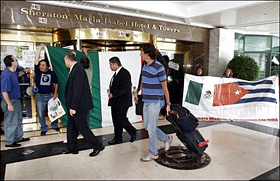 |
 |
 |
 News Around the Republic of Mexico | February 2006 News Around the Republic of Mexico | February 2006  
Mexico Vows to Prosecute U.S. Hotel
 Julie Watson - Associated Press Julie Watson - Associated Press


| | Members of the Mexican Movement of Solidarity with Cuba block tourists from entering the Sheraton Hotel in Mexico City, Tuesday, Feb. 7, 2006. The hotel could be fined or even closed for expelling Cuban guests at the behest of the U.S. Treasury Department, Mexican officials said Tuesday. (AP/Marco Ugarte) |
Mexico City – Mexico's vow to prosecute an American-owned hotel for adhering to the U.S. embargo of Cuba puts American businesses in a dilemma: Whose laws do they obey – those of their homeland or those of their host? No matter what they do, they could face legal action.

Mexico issued a complaint Tuesday against Hotel Maria Isabel Sheraton in Mexico City after it complied with a U.S. government request to expel a group of Cuban officials meeting with U.S. energy executives.

The expulsion outraged Mexico, an ally of Cuba, and alarmed American businesses that feel trapped between complying with Washington's demands and pleasing their host country.

“This is kind of one of the rare moments that really brings out the ugliness of the Helms-Burton law that puts American business in a tight position,” said Al Zapanta, president of the 2,000-member U.S.-Mexico Chamber of Commerce, referring to the 1996 U.S. law that strengthened sanctions in place against Cuba since 1961.

“You have to go into the international marketplace and you have to operate within the laws of the host country.”

Brookly McLaughlin, a spokesman for the U.S. Treasury Department's Office of Foreign Assets Control, said the department asked Starwood Hotels & Resorts Worldwide Inc., which owns the hotel, to expel the Cuban delegation in compliance with the Trading with the Enemy Act, established in 1917. The meeting was moved to a Mexican-owned hotel Saturday.

The act bans U.S. businesses and their subsidiaries from doing business with Cubans outside the United States.

Mexican officials, however, said the hotel violated investment and trade protection laws when its manager told the Cubans to leave.

In 1996, after the United States approved the Helms-Burton Act – which banned foreign investment in Cuba on properties confiscated from Americans – Mexico, Canada and other countries produced “antidote laws” meant to outlaw compliance with the U.S. measures.

Larry Rubin, chief executive officer of the American Chamber of Commerce in Mexico, said the hotel should have consulted Mexican authorities before booting the Cubans.

“Corporations have to find a balance,” said Rubin, whose 2,000 members represent 93 percent of U.S. investment in Mexico. “If it goes against Mexican law, then we cannot apply it, because first we have to abide by Mexican law. ... I mean you don't see American corporations down here breaking contracts and solving the matter in the U.S. court system. It just doesn't operate that way.”

Mexican authorities are threatening to slap the hotel with a nearly half million-dollar fine and possibly shut it down.

Standing near demonstrators who demanded punishment for the hotel, hotel guest Michele Radu said the Sheraton had no choice.

“There is an embargo and you've got to respect that,” said Radu, of San Francisco. “And oil is a sensitive issue to begin with. Are they going to break the embargo for oil now? I don't think so.”

But Zapanta said the U.S. legislation is hurting U.S. companies.

“This is a good example of how the U.S. Congress is somewhat myopic,” he said. “In a lot of ways, I kind of smile that this thing surfaced and will force the issue to be dealt with.”

Many wonder how far the Bush administration will go to undermine Fidel Castro's communist government.

“If you take this to its logical extreme, no Cuban can stay at any American hotel in the world and no Cuban can buy a McDonald's hamburger anywhere,” said Kirby Jones, president of the U.S.-Cuba Trade Association and the organizer of last week's private-sector energy summit at the Sheraton.

A Mexican businessman found himself caught between the two countries' politics in 1996.

The U.S. government warned Javier Garza Calderon, president of the Mexican company Grupo Domos, that if he did not pull his investment in Cuba's telephone company, he and his family would lose their U.S. visas. Garza Calderon's children were in U.S. schools at the time.

Mexican officials, however, warned Garza Calderon that if he complied, he would face fines of up to $300,000.

The U.S. government later barred Grupo Domos' officers from entering the United States.

Ramon Saul Sanchez, head of the anti-Castro Democracy Movement in Miami, said the United States should not extend its laws beyond its borders – but neither should U.S. executives do business with Cuba.

“These were two wrongs,” he said. | 
 | |
 |



